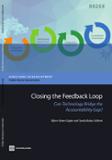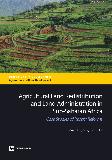The World Bank is a vital source of financial and technical assistance to developing countries around the world. We are not a bank in the ordinary sense but a unique partnership to reduce poverty and support development. The World Bank Group has two ambitious goals: End extreme poverty within a generation and boost shared prosperity.
- To end extreme poverty, the Bank's goal is to decrease the percentage of people living on less than $1.25 a day to no more than 3% by 2030.
- To promote shared prosperity, the goal is to promote income growth of the bottom 40% of the population in each country.
The World Bank Group comprises five institutions managed by their member countries.
The World Bank Group and Land: Working to protect the rights of existing land users and to help secure benefits for smallholder farmers
The World Bank (IBRD and IDA) interacts primarily with governments to increase agricultural productivity, strengthen land tenure policies and improve land governance. More than 90% of the World Bank’s agriculture portfolio focuses on the productivity and access to markets by small holder farmers. Ten percent of our projects focus on the governance of land tenure.
Similarly, investments by the International Finance Corporation (IFC), the World Bank Group’s private sector arm, including those in larger scale enterprises, overwhelmingly support smallholder farmers through improved access to finance, inputs and markets, and as direct suppliers. IFC invests in environmentally and socially sustainable private enterprises in all parts of the value chain (inputs such as irrigation and fertilizers, primary production, processing, transport and storage, traders, and risk management facilities including weather/crop insurance, warehouse financing, etc
For more information, visit the World Bank Group and land and food security (https://www.worldbank.org/en/topic/agriculture/brief/land-and-food-security1
Resources
Displaying 1711 - 1715 of 4907Land Rights and Economic Development : Evidence from Vietnam
The authors examine the impact of land
reform in Vietnam which gives households the power to
exchange, transfer, lease, inherit, and mortgage their
land-use rights. The authors expect this change to increase
the incentives as well as the ability to undertake long-term
investments on the part of households. Their
difference-in-differences estimation strategy takes
advantage of the variation across provinces in the issuance
Closing the Feedback Loop : Can Technology Bridge the Accountability Gap?
Enhanced transparency, accountability, and government or donor responsiveness to people needs are imperative to achieve better and more sustainable development results on the ground. The rapid spread of new technologies is transforming the daily lives of millions of poor people around the world and has the potential to be a real game changer for development.
Community Institutions, Sustainable Forest Management, and Forest Cover Change in Southern Japan
This research explores the activities of community institutions in achieving sustainable forest management (SFM) and sustained forest cover. Three institutions representing the administrative, economic, and social/traditional institutions were identified. The institutions had 30 forest management activities and satisfied about 66% of SFM Criteria and Indicators. A loss of 122 ha of forest cover was estimated over the last 30 yr, attributed to conversion of forests to built-up areas.
Agricultural Land Redistribution and Land Administration in Sub-Saharan Africa : Case Studies of Recent Reforms
The six case studies in this book were prepared as background studies for a synthesis report on land administration and reform in Sub-Saharan Africa (SSA). Collectively they cover two main areas of land governance: reforms in redistributing agricultural land; and reforms in land administration. The problems in land ownership inequality and poor land administration are defined and the question of why reforms are necessary is addressed. The first two case studies focus on reforms in redistributing agricultural land in Malawi and South Africa.
Making Spatial Change in Pakistan Cities Growth Enhancing
Cities' development matters to
Pakistan. It is central to economic growth, job creation and
quality of life. This is also one of the core themes in the
2011 Government of Pakistan Framework for Economic Growth
(FEG). This paper explores the conditions for
growth-enhancing spatial change in Pakistan s cities.
Cities' development matters to Pakistan. Two strands of
analysis are developed. First, it reviews the performance








